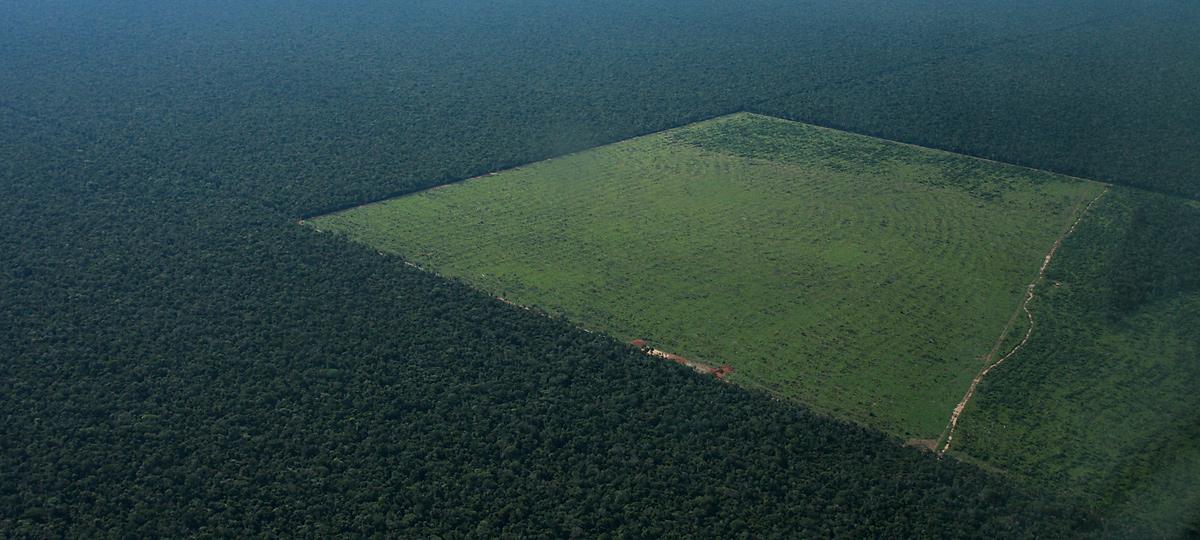RIO DE JANEIRO, BRAZIL – A fifth of Brazilian soy imports by the European Union may come from illegally deforested land, according to a study released on Thursday, July 16th, which provides detailed data on the supply chain.

The study, published by Science magazine, also opens the way for both international companies and Brazilian authorities to identify agricultural areas that violate deforestation rules in the Amazon, according to the study’s co-author, Raoni Rajão, an environmental expert from the Federal University of Minas Gerais (UFMG).
“Brazil has the means to develop a large-scale monitoring system run by the government, capable of freeing supply chains from deforestation,” Rajão said. “The technical means were unavailable before, but now we have developed such means”.
The study states that greater monitoring is particularly important since the country aims to feed the world.
Brazil, the world’s largest soy exporter, which until recently was competing with the United States for the title of largest producer, is on its way and should lead this market with ease by 2029, according to a report released on Thursday by the UN’s Food and Agriculture Organization (FAO) and the multinational Organization for Economic Cooperation and Development (OECD).
In the study, Rajão and other researchers analyzed deforestation in the Amazon and the Cerrado (tropical savanna ecoregion) since 2008, when the current Forestry Law came into force; before the law, farmers who respected certain criteria received an amnesty for the excessive felling of trees.
The team also found that 17 percent of Brazil’s beef exports to Europe are linked to deforestation.
However, there are only a few “rotten apples” in the meat and soybean supply chains, with only two percent of farms causing 62 percent of illegal deforestation in the analyzed area.
The study did not name the companies or farms involved in deforestation activities.
The study considered only Brazilian exports to the European Union, which received 16 percent of the country’s shipments of soy and soy meal in 2019. Rajão said the researchers focused on the EU partly because of a recent trade agreement between the European bloc and Mercosur – which, if ratified, would expand agricultural trade in both directions.
Rajão said that a future study could also analyse exports to China, Brazil’s largest buyer of soy and beef, which receives 64 percent of all shipments of the oilseed.
“These conclusions come at a critical moment, when the Brazilian government is being pressured to reverse its notoriously anti-environmental position that encourages Amazon deforestation,” said Philip Fearnside, ecologist with the National Institute of Amazon Research, who was not involved in the research.
Deforestation has increased in Brazil since President Bolsonaro took office in 2019, along with weakened environmental controls and calls for more agricultural and mining activities in forest areas.
Deforestation in the Amazon reached an 11-year high in 2019, with the destruction of an area the size of Lebanon, according to government data. In the first six months of 2020, there was an increase of 25 percent over the same period of the prior year, according to preliminary data.
The study also could lead to greater scrutiny of companies and industries that purchase products connected to deforestation, said Neus Escobar, an agricultural engineer at the University of Bonn, Germany, who was also not involved in the study. “They make a good contribution by adding this layer of transparency,” said Escobar.
When questioned, ABIOVE, an association of Brazil’s soybean industry that represents trading companies and processors, said its members do not buy soybeans from farms identified by Brazil as problematic. “Soy that is produced in illegally deforested areas, embargoed by environmental inspection bodies and included in the slave labor list does not enter the sector’s production chain,” it said.
The organization emphasized that it is the industry’s responsibility to ensure that the soybean source was produced in compliance with current legislation.
But it added that the inspection and regularization of the producer’s activities on rural properties is the responsibility of the relevant authorities, in charge of embargoing the property as a whole and releasing the official lists of environmental crime and slave labor.
Whenever a property is embargoed due to irregularities, purchases are automatically suspended, said the association.
It also said that a program led by ABIOVE, called the Soy Moratorium, contributed to the decline in deforestation in the Amazon associated with soybeans, since only 80,000 hectares have been planted in deforested areas since 2008, “because by identifying irregularly planted soybeans the whole property is excluded from the chain.”
For ABIOVE, the study produces a “distorted perception and leads to a high amount of soy to be associated with deforestation in a misleading way, since it does not state how much of the areas identified with illegal deforestation are already effectively embargoed by the relevant authorities.”
Source: Reuters

